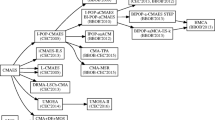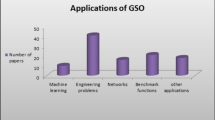Abstract
The search for life outside the Solar System is an endeavour of astronomers all around the world. With hundreds of exoplanets being discovered due to advances in astronomy, there is a need to classify the habitability of these exoplanets. This is typically done using various metrics such as the Earth Similarity Index or the Planetary Habitability Index. In this paper, Genetic Algorithms are used to evaluate the best possible habitability scores using the Cobb-Douglas Habitability Score. Genetic Algorithm is a classic evolutionary algorithm used for solving optimization problems. The working of the algorithm is established through comparison with various benchmark functions and its functionality is extended to Multi-Objective optimization. The Cobb-Douglas Habitability Function is formulated as a bi-objective as well as a single objective optimization problem to find the optimal values to maximize the Cobb-Douglas Habitability Score for a set of promising exoplanets.
Access this chapter
Tax calculation will be finalised at checkout
Purchases are for personal use only
Similar content being viewed by others
References
Back, T.: Evolutionary Algorithms in Theory and Practice: Evolution Strategies, Evolutionary Programming, Genetic Algorithms. Oxford University Press, Oxford (1996)
Bora, K., Saha, S., Agrawal, S., Safonova, M., Routh, S., Narasimhamurthy, A.: CD-HPF: new habitability score via data analytic modeling. Astron. Comput. 17, 129–143 (2016)
Cochran, W.D., Hatzes, A.P., Hancock, T.J.: Constraints on the companion object to HD 114762. Astrophys. J. 380, L35–L38 (1991)
Coma, C.W., Douglas, P.H.: A theory of production. In: Proceedings of the Fortieth Annual Meeting of the American Economic Association, vol. 139, p. 165 (1928)
Deb, K., Pratap, A., Agarwal, S., Meyarivan, T.: A fast and elitist multiobjective genetic algorithm: NSGA-II. IEEE Trans. Evol. Comput. 6(2), 182–197 (2002)
Eberhart, R.C., Shi, Y.: Comparison between genetic algorithms and particle swarm optimization. In: Porto, V.W., Saravanan, N., Waagen, D., Eiben, A.E. (eds.) EP 1998. LNCS, vol. 1447, pp. 611–616. Springer, Heidelberg (1998). https://doi.org/10.1007/BFb0040812
Fonseca, C.M., Fleming, P.J., et al.: Genetic algorithms for multiobjective optimization: formulation discussion and generalization. In: ICGA, vol. 93, pp. 416–423. Citeseer (1993)
Ginde, G., et al.: ScientoBASE: a framework and model for computing scholastic indicators of non-local influence of journals via native data acquisition algorithms. Scientometrics 108(3), 1479–1529 (2016)
Holland, J.H., et al.: Adaptation in Natural and Artificial Systems: An Introductory Analysis with Applications to Biology, Control, and Artificial Intelligence. MIT Press, Cambridge (1992)
Mishra, S.K.: Some new test functions for global optimization and performance of repulsive particle swarm method. Available at SSRN 926132 (2006)
Mühlenbein, H., Schomisch, M., Born, J.: The parallel genetic algorithm as function optimizer. Parallel Comput. 17(6–7), 619–632 (1991)
Planetary Habitability Laboratory: Exoplanet catalog (2019). http://phl.upr.edu/projects/habitable-exoplanets-catalog/data/database
Saha, S., et al.: Theoretical validation of potential habitability via analytical and boosted tree methods: an optimistic study on recently discovered exoplanets. Astron. Comput. 23, 141–150 (2018)
Saha, S., Sarkar, J., Dwivedi, A., Dwivedi, N., Narasimhamurthy, A.M., Roy, R.: A novel revenue optimization model to address the operation and maintenance cost of a data center. J. Cloud Comput. 5(1), 1–23 (2015). https://doi.org/10.1186/s13677-015-0050-8
Schulze-Makuch, D., et al.: A two-tiered approach to assessing the habitability of exoplanets. Astrobiology 11(10), 1041–1052 (2011)
Srinivas, N., Deb, K.: Muiltiobjective optimization using nondominated sorting in genetic algorithms. Evol. Comput. 2(3), 221–248 (1994)
Theophilus, A., Saha, S., Basak, S., Murthy, J.: A novel exoplanetary habitability score via particle swarm optimization of CES production functions. In: 2018 IEEE Symposium Series on Computational Intelligence (SSCI), pp. 2139–2147. IEEE (2018)
Sarasvathi, V., Iyengar, N.C.S.N., Saha, S.: QoS guaranteed intelligent routing using hybrid PSO-GA in wireless mesh networks. Cybernet. Inf. Technol. 15(1), 69–83 (2015)
Acknowledgment
We thank our teachers who gave us this opportunity to work on something innovative and provided us a rich learning experience in the process. We thank Dr. Snehanshu Saha for assistance with this endeavour and guiding us in this project. And finally, we would also like to show our gratitude to the PES University for allowing us to go beyond our coursework and work on a project with practical applications.
Author information
Authors and Affiliations
Corresponding author
Editor information
Editors and Affiliations
Rights and permissions
Copyright information
© 2020 Springer Nature Singapore Pte Ltd.
About this paper
Cite this paper
Krishna, S., Pentapati, N. (2020). Genetic Bi-objective Optimization Approach to Habitability Score. In: Saha, S., Nagaraj, N., Tripathi, S. (eds) Modeling, Machine Learning and Astronomy. MMLA 2019. Communications in Computer and Information Science, vol 1290. Springer, Singapore. https://doi.org/10.1007/978-981-33-6463-9_12
Download citation
DOI: https://doi.org/10.1007/978-981-33-6463-9_12
Published:
Publisher Name: Springer, Singapore
Print ISBN: 978-981-33-6462-2
Online ISBN: 978-981-33-6463-9
eBook Packages: Computer ScienceComputer Science (R0)




